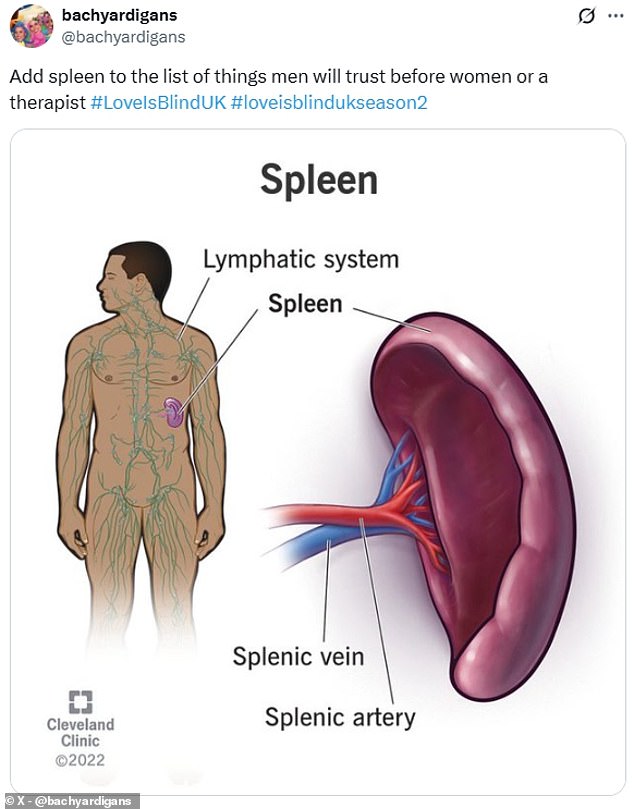Since the first episodes dropped last week, the new season of Love Is Blind UK has quickly become one of the most popular series on Netflix.
The series features a range of singletons looking for love – including a glamorous singer, a loveless dating–app creator and a party girl whose recent relationship broke down when she mentioned starting a family.
However, there’s one contestant who has really got viewers talking.
Patrick Justus, a ‘Human Design Coach’ from London, has baffled fans with his claims that the ‘best way to find love’ is to listen to your spleen.
‘I have this thing where I follow my spleen,’ he explained on a date in the first episode.
‘It might sound a bit weird, but it’s even more potent than your gut, and you follow it literally to the second. As soon as you feel that feeling that something’s going to be good or bad, you just trust it.’
His claims have been ridiculed across social media, with one user venting on X: ‘Every time that guy mentions trusting his spleen or the word splenic I just want to rage.’
Now, scientists have waded in on the debate – and unfortunately for Mr Justus, they have confirmed to the Daily Mail that ‘there is not any science to this.’

Patrick Justus, a ‘Human Design Coach’ from London, has baffled fans with his claims that the ‘best way to find love’ is to listen to your spleen
Mr Justus has coined the term ‘splenic awareness’, and mentioned his theory on several dates.
‘I’ve had a splenic intuitive hit,’ he said after one promising date.
And after a less successful date, he dramatically claimed: ‘My spleen is silent.’
Most of us have heard of a ‘gut feeling’ – a sudden flash of insight from deep within.
Our guts – or gastrointestinal tracts – are closely connected with our brains, which makes it possible for emotional experiences to register as gastrointestinal distress.
For example, if you feel anxious or fearful, you might feel nauseous.
Meanwhile, a feeling of love might bring on ‘butterflies’ in your stomach.
Unfortunately for Mr Justus, the same is simply not true for the spleen.

Patrick Justus has coined the term ‘splenic awareness’, and mentioned his theory on several dates

After a less successful date, he dramatically claimed: ‘My spleen is silent’
The spleen is a small organ in the upper left part of your abdomen, which stores and filters blood.
While it forms an important part of your immune system, you can survive without it, with other organs – particularly the liver – able to compensate for its absence.
Speaking to the Daily Mail, Dr Alexa Duff, a clinical psychologist with over 10 years experience working in the NHS, explained why there is ‘no science’ behind ‘splenic intuition’.
‘Given the location of the spleen, he wouldn’t be able to differentiate between a gut or spleenic feeling,’ Dr Duff explained.
‘If there was something wrong with his spleen, he would get sick with a virus or something rather than the upset stomach/unease feeling that you get in your gut.’
Joey Florez, a member of the American Psychological Association, agreed with Dr Duff’s advice.
‘There is no sign [the spleen] participates in our decision-making or emotional responses within relationships,’ he told the Daily Mail.
‘When people say “trust your gut,” they’re really calling for watchfulness for tiny bodily signals like tension, excitement, or unease that warn us to our mindsets regarding a person or situation.

One Love Is Blind UK viewer joked: ‘Add spleen to the list of things men will trust before women or a therapist’

This confirmation will come as no surprise to viewers, who have widely mocked Mr Justus for his claims

His claims have been ridiculed across social media, with one user on X venting: ‘Every time that guy mentions trusting his spleen or the word splenic I just want to rage’
‘Even if it’s fine to casually use the word “spleen,” psychologically, we want to avoid getting stuck between metaphor and biology.’
This confirmation will come as no surprise to viewers, who have widely mocked Mr Justus for his claims.
Taking to X, one user wrote: ‘Imagine a man breaking up with you and sincerely saying “I have to follow my spleen”. I would be so mad that I didn’t get there first.’
Another said: ‘This guy out here following his spleen for feelings on women he dates…and the world is wondering why women are not interested in dating anymore.’
And one joked: ‘Add spleen to the list of things men will trust before women or a therapist.’











